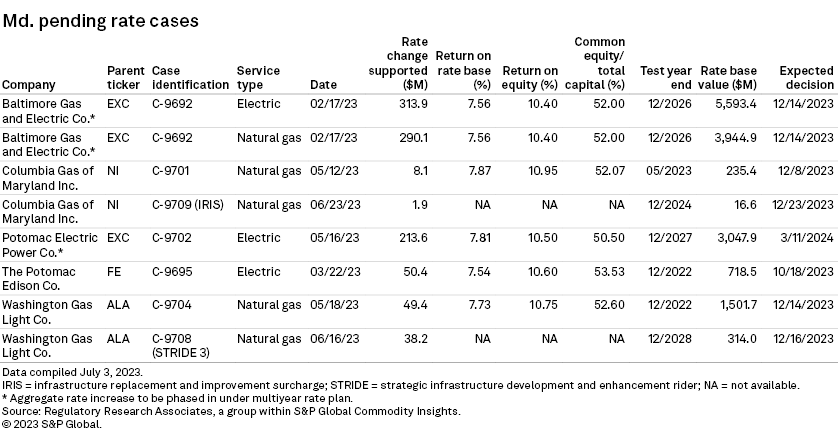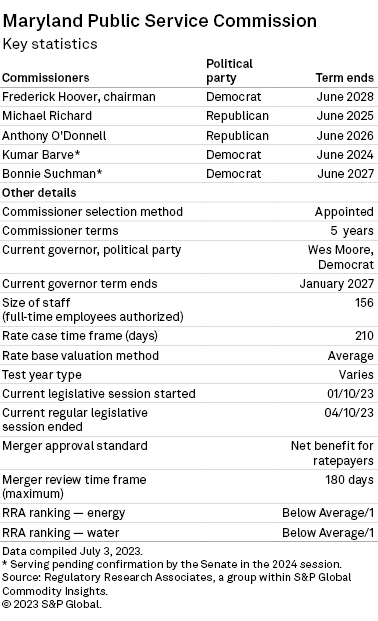Featured Topics
Featured Products
Events
S&P Global Offerings
Featured Topics
Featured Products
Events
S&P Global Offerings
Featured Topics
Featured Products
Events
S&P Global Offerings
Featured Topics
Featured Products
Events
Financial and Market intelligence
Fundamental & Alternative Datasets
Government & Defense
Professional Services
Banking & Capital Markets
Economy & Finance
Energy Transition & Sustainability
Technology & Innovation
Podcasts & Newsletters
Financial and Market intelligence
Fundamental & Alternative Datasets
Government & Defense
Professional Services
Banking & Capital Markets
Economy & Finance
Energy Transition & Sustainability
Technology & Innovation
Podcasts & Newsletters
Research — 13 Jul, 2023
Frederick Hoover, a Democrat, took over as chairman of the Maryland Public Service Commission on July 1, replacing the former chairman, Republican Jason Stanek, whose term expired June 30. A few days earlier, Democrat Bonnie Suchman began serving on the commission, replacing former Commissioner Odogwu Obi Linton, also a Democrat, who was serving beyond the end of an expired term.

➤ These recent changes complete the transition in the makeup of the PSC begun by Gov. Wes Moore, a Democrat, immediately upon taking office. The commission has a very active rate case agenda, with six major base rate cases pending, three of which involve multiyear rate plans, two infrastructure rider cases in progress and a host of regulatory policy proceedings underway.
➤ In the wake of these changes, the state's consumer advocacy group, the Office of People's Counsel (OPC), has taken a more aggressive stance on various issues. It is therefore noteworthy that the new chairman was an assistant people's counsel when Moore nominated Hoover to the PSC. It is unclear whether or how Hoover's previous ties to the OPC will impact the chairman's ability to participate in cases that began while Hoover was still at the OPC.
➤ Regulatory Research Associates views the Maryland regulatory climate as riskier than average for energy and water utility investors, and the recent turnover at the PSC is among the reasons for that assessment.


Commissioner selection process in Maryland
In Maryland, the governor appoints the commissioners, subject to Senate confirmation. Commissioners serve five-year staggered terms. Minority-party representation is not required, but a broad representation of the geographic and demographic diversity of the state and diverse training and experience are necessary.
If a new commissioner is nominated while the General Assembly is in session, the nominee cannot begin serving until confirmed by the Senate. If the General Assembly is not in session, the nominee may begin serving pending confirmation in the next session unless the governor rescinds the nomination before confirmation occurs. A commissioner may continue to serve beyond the end of a term until a successor is named by the governor and confirmed during a legislative session or until a replacement is named when the legislature is not in session.
The governor designates the commission chairman, who serves in that capacity for the duration of their term as commissioner.
Recent Maryland PSC turnover
Almost immediately upon taking office in January 2023, Moore rescinded two appointments to the PSC made by former Gov. Larry Hogan, a Republican, while the General Assembly was not in session. The seats were held by Linton, who served beyond the end of a term that expired in June 2022, and fellow Democrat Patrice "Patty" Bubar, who Hogan appointed to a partial term extending to June 2024.
At the same time, the governor named Hoover to replace Stanek. The Senate Executive Nominations Committee favorably reported Hoover's nomination April 3, and the full Senate approved the appointment April 7.
Moore had nominated a replacement for Linton, but the nominee withdrew from consideration. On April 6, Moore announced a plan to name Maryland State Delegate Kumar Barve, a Democrat, to one of the two then-pending positions on the commission once the session ended. Moore's announcement did not specify which open term Barve would serve.
The General Assembly adjourned in April, and Barve resigned from the House of Delegates on May 1. Barve was sworn in May 30 to serve the remainder of a partial term that extends through June 2024, replacing Bubar.
On June 14, Moore named Democrat Bonnie Suchman to replace Linton. Suchman was sworn in June 28 and is completing a partial term that extends through June 2027. Hoover took office July 1 and is serving a full five-year term that extends through June 2028. Hoover remained with the OPC until just before his tenure on the PSC was to begin, which is somewhat unusual. In RRA's experience, an appointee with ties to a stakeholder generally steps down soon after nomination or once confirmed, even if they are not taking office immediately. Given Hoover's very recent association with a stakeholder, the new chairman may be precluded from participating in pending cases.

About the new commissioners
When appointed to the PSC, Hoover was the assistant people's counsel. The OPC participates in all contested and administrative proceedings before the PSC and represents consumer interests. Before joining the OPC, Hoover was senior program director at the National Association of State Energy Officials. Hoover previously was director of the Maryland Energy Administration under former Gov. Parris Glendening, a Democrat, was its deputy director under previous Gov. Martin O'Malley, also a Democrat. Hoover was a founding board member of the Maryland League of Conservation Voters, the first Maryland-based environmental organization to hold elected officials at the state legislative and executive level accountable for environmental issues through voting scorecards, endorsements and direct campaign activities to elect environmentally responsible officials in Maryland. Hoover is also a member of the Maryland Cybersecurity Council. Hoover earned a law degree from the University of Baltimore and a bachelor's degree from Mount Saint Mary's College. Hoover also completed Harvard University's John F. Kennedy School of Government Executive Education Program in Economics and Environment.
Barve was a member of the Maryland House of Delegates from 1991 until resigning to join the PSC on May 1, 2023. While serving in the House, Barve was chairman of the House Environment and Transportation Committee, overseeing transportation, environmental, agricultural, ethics, housing and real property policy, and was the House majority leader from 2003 to 2014. Barve's legislative initiatives focused on healthcare reform, the promotion of technology and high-tech businesses and environmental issues. An accountant, Barve also served as the CFO of an environmental management company in Rockville, Md., and held positions with UNISYS Corp and Space Communications Corp. Barve holds a Bachelor of Science degree in accounting from Georgetown University's McDonough School of Business.
Suchman, an attorney, owned Suchman Law LLC, a private law firm. Before founding the firm in 2015, Suchman was employed by Troutman Sanders LLP. In these roles, Suchman has represented investor-owned utilities, independent power producers, marketers and alternative power producers on various electricity matters. Suchman is counsel to the US Partnership for Renewable Energy Finance and is US counsel to the Canadian Electricity Association. Before joining Troutman Sanders in 1999, Suchman was special counsel for Electric Utility Restructuring at the US Energy Department. Suchman was previously a senior attorney at the Edison Electric Institute and an associate at Webster & Fredrickson LLC, a law firm representing the District of Columbia Public Service Commission. Suchman holds a Bachelor of Arts degree in political science and government from Bard College and a Doctor of Law degree from The George Washington University Law School and is a member of the District of Columbia and Maryland Bar associations.
RRA view of the regulatory climate for energy and water utilities
For many years, RRA viewed the regulatory environment in Maryland as one of the most restrictive in the country from an investor viewpoint, representing among the highest levels of regulatory risk. The PSC relied on fully historical test years and average rate base valuations, which, all else being equal, exacerbate regulatory lag. At the same time, the PSC tended to approve authorized returns on equity (ROEs) that were consistently below prevailing nationwide averages. In addition, there was little in the way of alternative or performance-based regulation that gave the utilities a chance to augment earnings.
More recently, the state had begun to take a more constructive stance, implementing policies intended to mitigate regulatory lag and earnings volatility and approving ROEs that compared more favorably with prevailing industry averages when established. As a result, the regulatory climate in the state has moved closer to the industry average when it comes to investor risk.

Following Moore's election, RRA began to perceive a shift in the tenor of regulatory policy in the state. The election of a new governor, particularly one of the opposite party from the prior governor, creates a degree of risk concerning the regulatory climate in the state under the best of circumstances. In this instance, the change in governor has brought considerable upheaval in the PSC's makeup, creating greater uncertainty.
The turnover at the commission is particularly concerning for investors, coming at a time when the state is considering major issues related to the pace of the energy transition and when the PSC has six major energy utility rate cases before it, three of which involve multiyear rate plans.
The changes in the commission makeup seem to have emboldened the OPC, the state's consumer advocacy agency. In April, the OPC filed a rulemaking request challenging the commission's discretion in responding to issues brought before it by the agency. While the PSC majority rejected the request, one commissioner sided with the OPC and suggested that such a proposal may receive a more receptive response if resubmitted. The OPC sought rehearing of the decision, but the PSC denied the request June 27.
Similarly, the PSC had closed an investigation into the relationship between FirstEnergy Corp. and its subsidiary, The Potomac Edison Co., and its impact on Maryland ratepayers, finding that insufficient basis exists to continue its investigation. The OPC again filed for reconsideration and reopening of the proceeding, but the commission rejected the motion June 23.
Should the OPC decide to pursue this further, the only option would be to appeal the decision to the state courts.
The OPC has taken more confrontational stances in recent rate cases as well, recommending rate changes that were substantially below those sought by the company and recommended by the PSC staff. Similarly, the OPC's ROE recommendations have been well below prevailing industry averages when the cases were being litigated.
Moore has also pledged to accelerate the energy transition, but only modest activity occurred during the 2023 legislative session. While RRA views the energy transition as neither constructive nor restrictive from an investor standpoint, the pace of the transition and whether the process considers investor concerns impacts the level of regulatory risk. Several policy proceedings are underway before the PSC to address transition-related issues.
For the reasons outlined above, in conjunction with a May 2023 comprehensive review of its rankings, RRA lowered the ranking of Maryland regulation to Below Average/1 from Average/3.
For additional information regarding RRA's regulatory rankings process, refer to the latest "RRA Quarterly Regulatory Evaluations" report. For additional detail on Maryland energy regulation, refer to the Maryland Commission Profile.
For water utilities, RRA also views the regulatory environment in Maryland as restrictive from an investor viewpoint. ROE authorizations by the PSC have largely been at prevailing industry averages when established; however, the PSC relies on a test period that is historical by the time a case is decided and utilizes test-year average rate base valuations, which exacerbates regulatory lag. Although the water sector has avoided the politically charged climate that investors associate with Maryland energy utility regulation, the commission has been reluctant to implement innovative mechanisms, and the water utilities do not have any tools to mitigate regulatory lag. Legislation enabling the consolidation of municipal systems was passed a few years ago but has yet to be utilized in a transaction. RRA accords Maryland regulation a Below Average/1 rating for water utilities.
Regulatory Research Associates is a group within S&P Global Commodity Insights.
S&P Global Commodity Insights produces content for distribution on S&P Capital IQ Pro.
For a complete, searchable listing of RRA's in-depth research and analysis, please go to the S&P Capital IQ Pro Energy Research Library.
For a full listing of past and pending rate cases, rate case statistics and upcoming events, visit the S&P Capital IQ Pro Energy Research Home Page.
This article was published by S&P Global Market Intelligence and not by S&P Global Ratings, which is a separately managed division of S&P Global.
